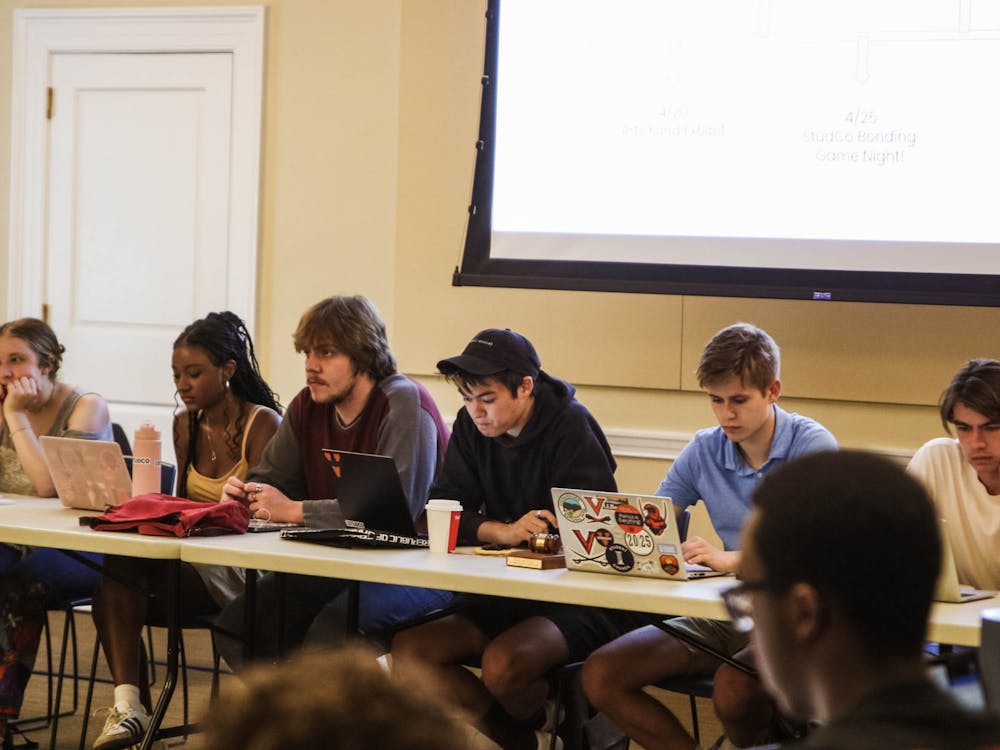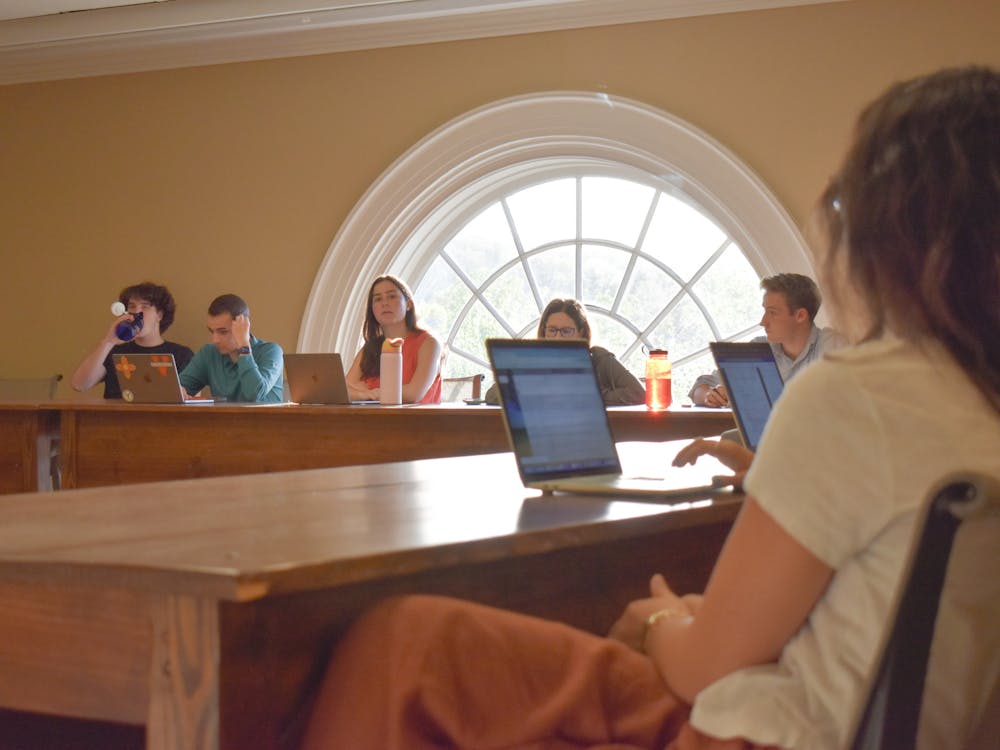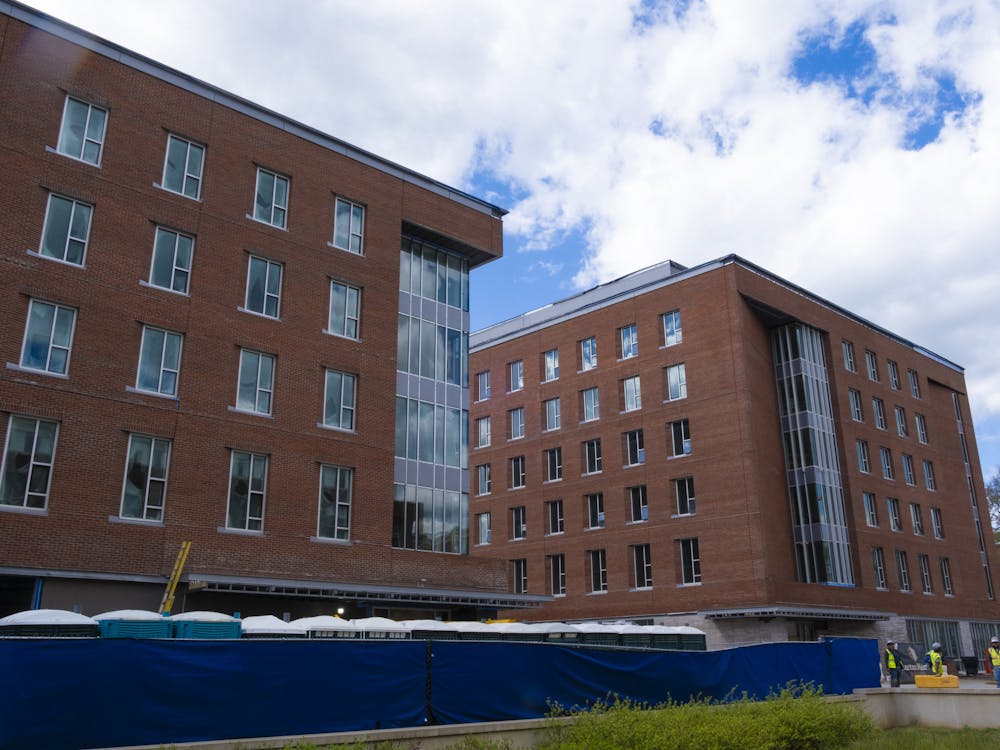As the Honor Committee prepares to potentially propose referenda this spring, the head of the Committee and head of the University Board of Elections reached a point of contention regarding virtual petition signatures, per emails between the UBE selection committee obtained by The Cavalier Daily. As the author of the main proposal being debated by the Honor Committee has voiced he will bring the proposal to a petition should the Committee fail to pass it internally, such policies are directly relevant to the future of Honor’s constitution.
The emails include communication between Andy Chambers, chair of the Honor Committee and fourth-year College student, Max Bresticker, chair of the University Board of Elections and fourth-year College student, Abel Liu, president of Student Council and fourth-year College student, Lauren Kim, chair of the University Judiciary Committee and fourth-year College student and Chloe Lyda, president of Fourth Year Trustees and fourth-year College student.
This group of student leaders comprises the UBE selection committee, which is tasked with reviewing, evaluating and selecting individuals to serve as chair or vice-chair of UBE, per UBE’s constitution. Bresticker was appointed chair of UBE this fall following the unexpected resignation of the organization’s previous chair.
Per the email chain, Bresticker reached out to the group Dec. 2 with a slate of vice-chairs — other students who help the chair of UBE oversee the administration of student body elections. Typically, these vice-chairs are appointed much earlier in the chair of UBE’s term, but due to the previous chair’s resignation, the process was delayed significantly. Bresticker also attached a copy of UBE’s most current constitution to the email.
In the following days, conflict ensued between Chambers and Bresticker, most of which concerned the number of signatures required for an individual to put referenda on the ballot. Chambers primarily took issue with the fact that UBE changed its constitution in 2017 to decrease the number of signatures required from 2,100 to 1,250, as well as Bresticker’s decision to continue permitting virtual signatures — a practice that was first implemented last year due to the pandemic.
If referenda are not passed internally, anyone may individually gather signatures from the student body to put it on the ballot. Christopher Benos, third-year Law student and Honor Committee representative, has pledged to do just that if the Honor Committee fails to pass his proposal internally before UBE’s Feb. 5 deadline for organizations to propose referenda.
Chambers said he “disagree[d] philosophically with the proposed changes,” adding that he would not vote in favor of confirming Bresticker’s proposed vice-chairs if the petition threshold was not increased.
“I cannot and will not support the appointment of any vice chair without interviewing them and hearing an affirmation that they will maintain the policy of UBE that has stood for years until the proper time for such changes arises at the close of our terms,” Chambers said.
Chambers added that he felt the policy “cast doubt” on the validity of UBE’s processes and student self governance more generally.
“Both of these changes are cheapening student self governance and the established safeguards baked into institutions like Honor, UJC [and] Studco,” Chambers said in an email statement to The Cavalier Daily. “I also firmly detest the watering down of the UBE’s processes to pander to falling voter turnout. I think a UBE Chair ought to be an impartial champion of increased involvement — not an unchecked decision-maker decreasing the bar so that an apathetic voter base can implement what they could not otherwise do.”
Bresticker denied that the decision to decrease the signature threshold was his alone, clarifying that UBE can only amend its election rules by a majority vote of its board.
“I am offended by the insinuation that I, unilaterally, am ‘[decreasing] the number of signatures needed to put up constitutional referenda for Honor, UJC and presumably other organizations by over half,” Bresticker said.
Additionally, Bresticker said UBE opted to continue using a virtual platform to tally signatures because it provides increased security, greater opportunity for dissemination and instantaneous tallying as opposed to manually counting paper petitions.
“Although the pandemic certainly provided the impetus for the creation of last year’s system, it was also part of a larger drive to modernize [UBE],” Bresticker said. “UBE’s interest is in advancing democracy on Grounds — erecting artificial barriers that seek to limit the choices students will have access to on election day seems antithetical to this principle.”
In response to Chambers’ allegation that he was expressing a “clear preference” during elections, Bresticker said this claim had “no basis in fact” and was “malicious.” Additionally, Bresticker said he was made “very uncomfortable” by the “seemingly quid-pro-quo arrangement” suggested by Chambers’ refusal to approve his vice-chair appointments without a change to petition or referenda signature count policies.
“Resorting to such threats makes me question the desired outcome of Andy,” Bresticker said. “I fear that UBE may currently be being pressured to erect technically harder referenda petition procedures, so as to reduce the possibility that an undesired referendum will be ratified in March. Should that be your fear Andy, I implore you to have faith in the democratic process and the judgment of the University community.”
Liu responded to Bresticker’s email Dec. 3 and said he found Bresticker’s defense “compelling.”
“[I] am not concerned by a more secure virtual signature collection method,” Liu said. “I would be opposed, however, to decreasing the binding referenda signature threshold. I understand that this is not your intention and, therefore, am not concerned by your proposed reforms.”
Chambers responded to the group again Dec. 5 and said Bresticker’s response indicated a “clear bias” against him, continuing that his previous communication included no mention of a quid-pro-quo. Any suggestion of this, Chambers said, was “nearing on libel.”
“Max — I’d encourage you to check where you quote me in your ad-hominem attacks,” Chambers said. “You are using straw-man tactics in your characterization of my arguments and it is unbecoming.”
Liu, Lyda and Kim each responded and explained that they needed additional time to circle back with their respective organizations and come to a decision.
“I also would like to remind everyone that we are not gods or some all-powerful beings,” Lyda wrote in a response to the group. “I think we all need to sit back, check our egos and remind ourselves that we are privileged and honored to be in these positions and to be able to serve students.”
Bresticker responded a final time Dec. 5 and said Chambers should not mistake his “unwillingness to be bullied into policy commitments” as an indication of bias or hatred.
“In the eyes of myself and the former UBE chair, you appear to be making my ability to run a functional Board this year contingent on a commitment to a) not use electronic petitions and b) amend our rules and regulations to suit your desired threshold,” Bresticker said. “I welcome disagreement and I truly hope that you continue to hold me to a high standard. I seek to do this role to the best of my ability, and I cannot do that without your feedback. However, this does not mean that I will welcome being forced to make policy commitments under duress.”
One day later, both Kim and Lyda voted to approve the three vice-chairs nominated by Bresticker. Liu did the same Dec. 8.
“It is unfortunate that this exchange happened; however, I am glad that UBE's vice chairs were ultimately able to be confirmed,” Bresticker said in an email statement to The Cavalier Daily. “I look forward to a productive relationship with the Honor Committee and their candidates come this spring’s elections.”
Though Chambers has chosen to abstain from voting on the constitutional reforms proposed in the Honor Committee this semester, should Benos’s proposal independently garner enough signatures to make it on the ballot this spring in lieu of being passed by the Honor Committee internally, Chambers said he does not plan to vote for it.
“I’ll vote no every time and I’ll tell everyone I know to vote no,” Chambers said in an interview with The Cavalier Daily.
The deadline for the Honor Committee, University Judiciary Committee and Student Council to decide on a proposal to introduce as referenda for this spring’s elections is Feb. 5 at 4 p.m.
This story is the third and final installment in a three-part series examining the Honor Committee’s efforts at reforming its constitution since April. The first installment can be accessed here and the second installment can be found here.
CORRECTION: A previous version of this article referred to the Honor Committee, the University Judiciary Committee and Student Council as special status organizations. Student Council is a special status organization, while UJC and Honor are agency organizations.

![<p>Chambers said he “disagree[d] philosophically with the proposed changes,” adding that he would not vote in favor of confirming Bresticker’s proposed vice-chairs if the petition threshold was not increased. </p>](https://snworksceo.imgix.net/cav/34b869a0-a43b-44c9-90df-5a4ab54350ef.sized-1000x1000.jpg?w=1000)



